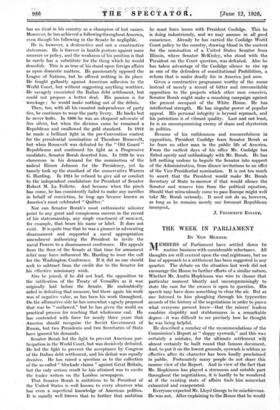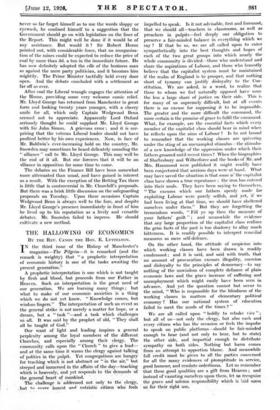THE WEEK IN PARLIAMENT
BY NEW MEMBER.
MEMBERS of Parliament have settled down to routine business with considerable reluctance. All thoughts are still centred upon the coal nightmare, but no line of approach to a settlement has been suggested in any quarter. The debate on the situation last week did not encourage the House to further efforts of a similar nature. Whether Mr. Austin Hopkinson was wise to choose that particular moment bluntly and uncompromisingly. to state the case for the owners is open to question. His speech may have done something to clear the air. But as one listened, to him ploughing through his typewriter records of the history of the negotiations in order to prove what everyone present knew—that the miners' leaders combine stupidity and stubbornness in a. remarkable degree—it was difficult to see precisely how he thought he was being helpful.
He described a number of the recommendations of the Commission's Report as "sloppy eyewash," and this was certainly a mistake, for the ultimate settlement will almost certainly, be built round that famous document. And, to put it on the lowest grounds, eyewash is seldmn as effective after, its character has been loudly. proclaimed in public. Fortunately many people do not share this morose view of the Report. And in view. of the fact that Mr. Hopkinson has played a strenuous and notable part throughout the negotiations, it is hardly to be wondered at if the existing state of affairs finds him somewhat exhausted and exasperated.
Everyone expected Mr. Lloyd George to be mischievous. He was not. After explaining to the House that he would never so far forget himself as to use the words sloppy or eyewash; he confined himself to a suggestion that the Government should go on with legislation on the lines of the Report. This .might well be done if it would be of any assistance. But would it ? Sir Robert Home pointed out, with considerable force, that no reorganiza- tion of the mines could be expected to reduce the price of coal by more than 8d. a ton in the immediate future. He has now definitely adopted the ?We of the business man as against the mere party politician, and it becomes him mightily. The Prime Minister tactfully held every door open. And the debate concluded with a settlement as far off as ever.
After coal the Liberal wrangle engages the attention of the House, providing some very welcome comic relief. Mr. Lloyd George has returned from Manchester in great form and looking twenty years younger, with a cheery smile for all, which only Captain Wedgwood Benn seemed not to appreciate. Apparently Lord Oxford seriously thought he could supplant Mr. Lloyd George with Sir John Simon. A grievous error ; and it is sur- prising that the veteran Liberal leader should not have profited better by his own experiences. Now, in face of Mr. Baldwin's ever-increasing hold on the country, Mr. Snowden may sometimes be heard delicately sounding the " alliance " call to Mr. Lloyd George. This may well be the end of it all. But one foresees that it will be an alliance in opposition for some time to come.
The debates on the Finance Bill have been somewhat more attenuated than usual, and have gained in interest as a result. With the exception of the Betting Tax there is little that is controversial in Mr. Churchill's proposals. But there was a brisk little discussion on the safeguarding proposals on Tuesday. Upon these occasions Captain Wedgwood Benn is always well to the fore, and despite Mr. Lloyd George's presence immediately in front of him he lived up to his reputation as a lively and versatile debater. Mr. Snowden failed to impress. He should cultivate a new method.























































 Previous page
Previous page